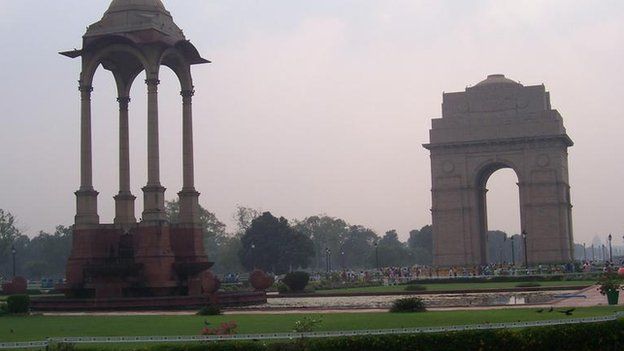Delhi media gossip sets Indian Twitter abuzz
- Published

Lutyens' Delhi is often described as India's power centre.
The area in the capital city, designed by British architect Edwin Lutyens in the 1920s, houses India's parliament, central administrative blocks and the presidential palace.
Most Indian and foreign journalists often visit the area for stories and interviews.
And now social media too seems to be reaping the benefits of Lutyens' Delhi's popularity.
Unverified Twitter accounts like "Lutyens' Spice", "Lutyens Masala" and "Lutyens Insider" are dishing out a good dose of gossip and rumours about Delhi's politicians, journalists and businessmen.
Lutyens' Spice has more than 20,000 followers, while its "rival" Lutyens Masala has 12,000, and Lutyens Insider is at the top with 27,000 followers.
They tweet about "secret meetings" between politicians, business deals, journalists and their ties with political parties, and sometimes even rumours about personal lives of prominent people.
And some of their tweets get re-tweeted hundreds of times.
Senior journalist Girish Nikam says gossip has always been a part of random conversations between journalists who cover the Lutyens' zone.
But he finds the trend of such unverified gossip being published on social media platforms disturbing since it makes it easy for people to post slanderous information without being held accountable for it.
"Gossip on dinner table is fine among fellow journalists. But the kind of information these anonymous Twitter accounts are releasing is defamatory and disturbing," he says.
But then why are so many prominent journalists following these accounts?
Mr Nikam says journalists love gossip and that too mostly about their colleagues and politicians.
"But these accounts have set a dangerous trend. A slanderous piece of information can easily destroy somebody's career," he says.
Madhu Trehan, editor of media website newslaundry.com, agrees with Mr Nikam.
"There is an unwritten rule in Indian journalism that we stay away from politicians' personal lives. But what these accounts are doing is just gossip. They are posting just anything," she says.
Comic relief?
But some say that these accounts provide comic relief in an otherwise charged political atmosphere of Delhi.
Ms Trehan, however, disagrees with the thought.
She says that such accounts do not offer any satire and mostly post information that may or may not be true.
Ms Trehan runs her own online media satire show, and feels that Indian journalists are slowly getting used to the craft.
"They [journalists] were not comfortable when I started my show. But now most of them have become used to it. That happened mainly because we are not anonymous," she says.
She adds that her show is all about using satire to hold journalists accountable to their stories.
But not many Indian TV channels allow such independent media satire shows.
Mr Nikam says politicians, journalists and media owners are very cautious about their image in the times of constant media spotlight.
"So it's natural that we do not have many good satire shows based on media outlets and journalists," he says.
So are these Twitter accounts filling that absence?
Both Mr Nikam and Ms Trehan disagree.
"These Twitter accounts are popular among journalists. But they will disappear sooner than later because gossip has a shelf life," says Mr Nikam.